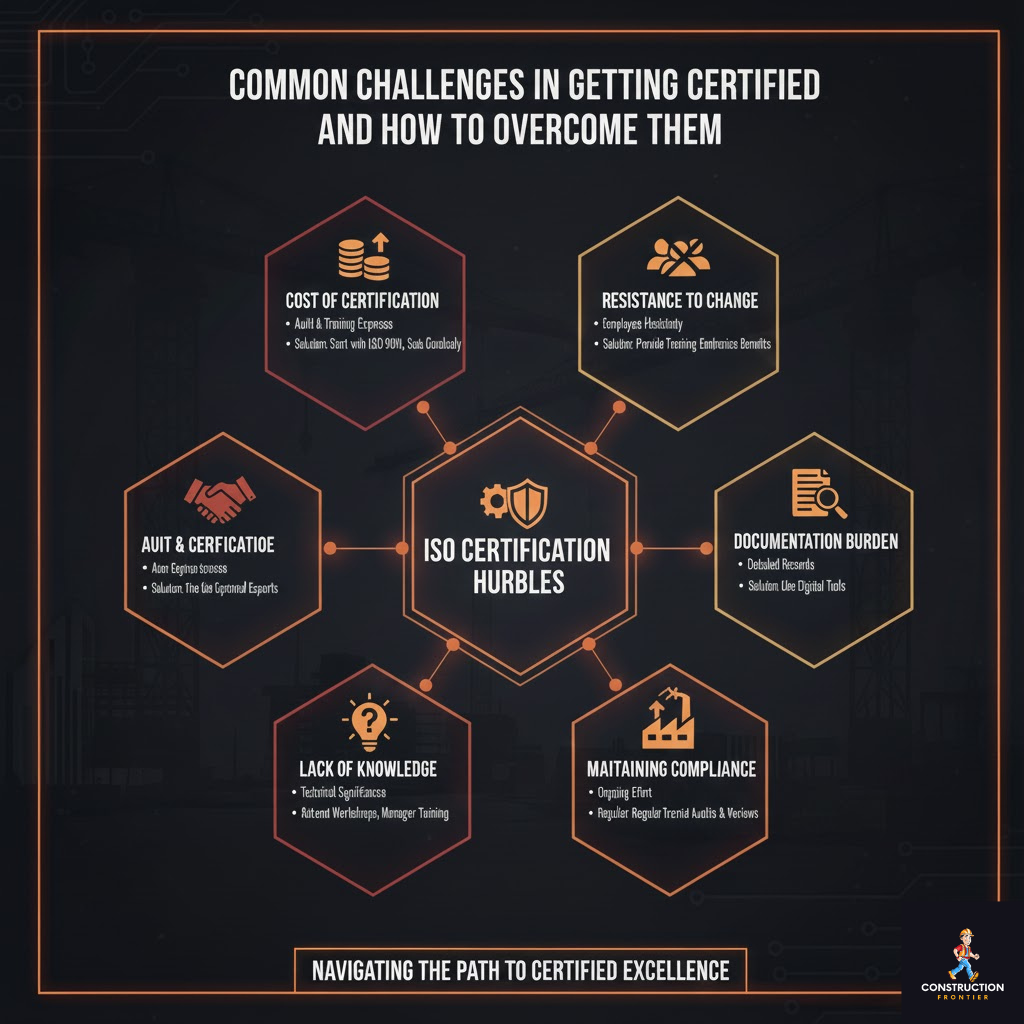ISO Certification for Construction Companies: 6 Benefits, Requirements, and Powerful Business Impact
ISO certification for construction companies has evolved from a mere compliance requirement to a strategic advantage. From improving safety and efficiency to enhancing credibility and helping firms win lucrative tenders, ISO standards are shaping the future of construction worldwide, including in Kenya.
Why ISO Certification Matters in Construction
The construction industry is one of the most competitive and high-risk sectors globally. There is constant pressure on companies to deliver projects on time, within budget, and to the highest standards of safety and quality. In such an environment, ISO certification for construction companies has emerged as a powerful differentiator.
“Far from being a bureaucratic hurdle, ISO certification demonstrates a company’s commitment to internationally recognised standards in quality, safety, environmental sustainability, and management practices. It provides a competitive edge for construction firms—helping them qualify for government tenders, attract investors, and build long-term client trust.”
In Kenya and across East Africa, the push for ISO certification in the construction industry has intensified. Regulatory bodies, clients, and international partners increasingly demand certified firms to ensure compliance, efficiency, and safety.
This article examines the benefits, standards, processes, and long-term competitive advantages of ISO certification for construction companies, offering practical insights for firms seeking to make the transition.
What Is ISO Certification?
The International Organisation for Standardisation (ISO) develops and publishes global standards to ensure products, services, and systems meet quality, safety, and efficiency benchmarks.
For construction companies, ISO certification means:
- Adopting structured management systems.
- Following internationally recognised best practices.
- Being audited by independent certification bodies to confirm compliance.
While there are many ISO standards, some are particularly relevant to the construction industry.
Key ISO Standards for Construction Companies
Construction companies can pursue different ISO standards depending on their focus areas. The most important include:
#1. ISO 9001 – Quality Management Systems
- Ensures projects are delivered consistently to meet client expectations.
- Helps reduce errors, rework, and project delays.
- Improves efficiency across procurement, design, and execution stages.
#2. ISO 14001 – Environmental Management Systems
- Encourages sustainable construction practices.
- Helps companies manage waste, energy use, and environmental risks.
- Supports compliance with environmental policies in Kenya and globally.
#3. ISO 45001 – Occupational Health and Safety
- Protects workers by reducing risks on construction sites.
- Enhances safety culture and legal compliance.
- Reduces downtime caused by accidents or workplace injuries.
#4. ISO 50001 – Energy Management Systems
- Focuses on reducing energy consumption in construction projects.
- Helps cut costs and carbon footprint.
#5. ISO 27001 – Information Security Management
- Increasingly relevant for construction companies handling digital designs, contracts, and project data.
- Protects sensitive project information against cyber threats.
These standards can be pursued individually or integrated into a comprehensive ISO certification programme for construction companies.
Benefits of ISO Certification for Construction Companies
ISO certification provides tangible and intangible benefits that directly impact competitiveness, safety, and profitability.
1. Winning Government and Private Tenders
- Many government projects in Kenya and beyond now require ISO-certified contractors.
- Certification demonstrates reliability and quality, improving bid success rates.
Tip: How ISO Certification Helps Construction Companies Win Tenders.
2. Enhanced Reputation and Client Trust
- Clients see certification as a guarantee of professionalism.
- Builds long-term credibility in a crowded market or niche.
- Particularly important for firms seeking international partnerships.
3. Improved Safety and Compliance
- With ISO 45001, companies reduce workplace hazards.
- Lower accident rates mean fewer delays and lawsuits.
- Reinforces commitment to worker welfare.
4. Operational Efficiency and Cost Savings
- ISO-certified companies adopt streamlined processes.
- Reduced rework, fewer delays, and better resource utilisation.
- Leads to lower project costs and higher profit margins.
5. Environmental Responsibility
- With ISO 14001, companies align with Kenya’s green construction policies.
- It attracts eco-conscious investors and clients.
- The ISO certification positions firms as leaders in sustainable urban development.
6. Global Competitiveness
- The ISO certification is recognised worldwide, offering a competitive edge in pre-tendering.
- It provides opportunities for cross-border contracts and joint ventures.
Step-by-Step ISO Certification Process for Construction Companies
Securing ISO certification for construction companies is often intimidating, but it follows a clear and structured path. Approaching the process methodically leads to certification and transforms company operations. Below is a detailed, step-by-step guide:
1. Gap Analysis
- The journey begins with a self-assessment of the company’s existing systems against ISO standards.
- This involves reviewing everything from project management practices and safety protocols to environmental policies and quality assurance procedures.
- The goal is to pinpoint gaps where the company falls short of ISO expectations. For instance, a contractor may have safety protocols in place but lack proper documentation and worker training.
- A gap analysis often reveals efficiency and compliance opportunities that extend beyond certification.
2. System Development
- Once the gaps are apparent, the company must design or refine systems to meet ISO requirements.
- This step involves writing new policies, updating quality manuals, and setting up Standard Operating Procedures (SOPs).
- For example, under ISO 9001, a construction firm would create documented processes for procurement, project tracking, and handling client feedback.
- Proper documentation is crucial since auditors rely heavily on written evidence.
3. Staff Training and Awareness
- ISO certification cannot succeed without the buy-in of employees. This stage ensures everyone in the company understands ISO standards and their role in compliance.
- Training may include:
- Toolbox talks for workers on safety (ISO 45001).
- Workshops for managers on risk assessment.
- Seminars for administrative staff on documentation and reporting.
- The outcome is a workforce aligned with the company’s new standards, fostering a culture of quality and accountability.
4. Implementation
- With systems in place and staff trained, it’s time to implement the plans.
- This involves adhering to documented procedures in daily operations, such as conducting safety drills, following quality checklists, and monitoring environmental impacts.
- At this point, companies frequently identify practical issues, such as reporting delays or resistance to change, which they can address.
- Implementation should run for several months to generate real audit data.
5. Internal Audit
- Before inviting an external auditor, the company must conduct an internal audit.
- This review checks whether procedures are being followed consistently and identifies nonconformities.
- Internal audits provide a “practice run”, allowing the firm to fix issues without risking certification failure.
- Some companies hire external consultants to assist at this stage for an objective review.
6. Certification Audit
- An accredited certification body (e.g., Bureau Veritas, SGS, or Kenya Bureau of Standards) conducts a two-stage audit:
- Stage One (Documentation Review): The auditor checks manuals, procedures, and records.
- Stage Two (On-Site Audit): The auditor visits project sites and offices to verify the implementation of documented systems.
- If the company passes, it receives an official ISO certificate valid for three years, subject to periodic surveillance audits.
7. Continuous Improvement
- ISO certification is not a one-time achievement; it’s a continuous commitment.
- Companies must conduct regular management reviews, annual audits, and staff training sessions.
- By embracing continuous improvement, construction firms remain compliant, adapt to new industry regulations, and keep ahead of competitors.
In short, the ISO certification journey transforms a company from within, building stronger systems, empowering staff, and laying a solid foundation for growth.
Competitive Edge: Why ISO Certification Matters in the Construction Industry
The construction industry is fiercely competitive, especially in African markets, where firms compete for multi-billion-dollar government and private projects. ISO certification provides a clear edge, separating serious players from the rest. Here’s why:
1. Risk Management
- Construction projects face numerous risks, including cost overruns, site accidents, environmental impacts, and reputational damage.
- ISO standards help companies anticipate and mitigate risks before they escalate.
- For example, ISO 45001 mitigates safety risks, while ISO 14001 reduces environmental liabilities. Together, they protect both workers and the company’s reputation.
2. Tender Prequalification
- Many large-scale projects now require bidders to hold ISO certification as a minimum criterion.
- Without it, firms are disqualified before even submitting proposals.
- ISO-certified contractors demonstrate credibility and adhere to global best practices, instantly making them more attractive to clients.
3. Employee Motivation and Retention
- Workers feel safer and more valued in companies that prioritise ISO-driven systems.
- Transparent processes reduce confusion, while safety standards lower the risk of accidents.
- Motivated employees are more productive, loyal, and innovative, giving the company a competitive edge.
4. Client Retention and Reputation
- Beyond winning contracts, ISO certification helps firms retain clients by consistently meeting expectations.
- Clients see certification as a guarantee of reliability, reducing the likelihood of disputes or project abandonment.
- Over time, this consistency builds a strong reputation, one of the most potent assets in construction.
5. Future-Proofing
- With regulatory demands tightening globally, uncertified companies risk exclusion from major projects.
- Governments and private clients demand sustainable, safe, and efficient practices, and ISO-certified firms are already leading the way.
- Certification protects against future compliance challenges, ensuring firms remain competitive even as industry standards evolve.
Common Challenges in Getting Certified and How to Overcome Them
While ISO certification is rewarding, construction companies often face hurdles:
(i) Cost of Certification: Smaller firms worry about audit and training expenses.
Solution: Start with ISO 9001 as the foundation and scale gradually.
(ii) Resistance to Change: Employees may resist new processes.
Solution: Provide training and emphasise long-term benefits.
(iii) Documentation Burden: ISO requires detailed records.
Solution: Use digital tools for document management.
(iv) Maintaining Compliance: Certification requires ongoing effort.
Solution: Schedule regular internal audits and reviews.
(v) Lack of Knowledge: Some companies may not fully understand the technical significance of ISO certification.
Solution: Incorporate training, and have company managers attend ISO workshops and seminars.
(vi) Hiring the wrong ISO consultant: Some consultants might not be a good fit for your company, especially if they are not in the construction sector.
Solution: Hire a consultant with adequate experience within your region and country, e.g., Valuemax Consulting in Nairobi.
ISO 9001 Certification Benefits for Contractors and Builders
Among all standards, ISO 9001 stands out as the most widely adopted in the construction industry.
- Ensures quality management across all project stages.
- Builds customer satisfaction through consistent delivery.
- Reduces disputes, claims, and contractual penalties.
- Encourages continuous improvement—a critical factor in long-term growth.
For builders and contractors in Kenya, ISO 9001 often serves as the gateway certification, paving the way for additional standards such as ISO 14001 and ISO 45001.
ISO Certification in the Kenyan Construction Industry
Kenya’s construction sector is booming, with major projects in roads, railways, housing, and urban development. However, competition is fierce. Local and international firms are vying for multimillion-shilling projects, and certification often makes the difference.
- The National Construction Authority (NCA) has encouraged firms to adopt global best practices.
- Many multinational contractors operating in Kenya require ISO-certified local partners.
- ISO certification benefits for construction companies in Kenya include easier compliance with Kenyan laws, improved investor confidence, and alignment with Vision 2030 development goals.
Case in point: Several large infrastructure projects in Nairobi have been awarded to ISO-certified contractors, underscoring how certification is increasingly tied to project eligibility.
The Future of ISO Certification in Construction
Globally, the construction industry is moving toward digitalisation, sustainability, and a safety-first culture. ISO standards are evolving to reflect these priorities.
With the government’s focus on affordable housing, smart cities, and infrastructure in Kenya, ISO-certified firms are expected to remain in high demand. Firms that embrace certification today will lead tomorrow’s construction landscape.
Conclusion: ISO Certification as a Strategic Investment
ISO certification for construction companies is about more than meeting regulations. It is about securing long-term growth, credibility, and market leadership. Whether it’s winning tenders, ensuring safety, or driving efficiency, certification gives firms the competitive edge they need in a challenging industry.
For Kenyan firms, ISO certification is also about aligning with national development goals and positioning for global competitiveness. Therefore, it is an excellent idea for a company to pursue ISO certification at various levels to solidify its future work credibility and pre-tendering process.
Stay Ahead in Construction Compliance and Competitiveness
At Construction Frontier, we provide you with insights on certifications, compliance, and industry trends that are shaping the future of construction in Kenya and beyond. Visit ConstructionFrontier.com to explore more guides, news, and strategies to give your construction business a winning edge.













